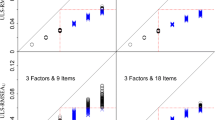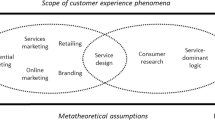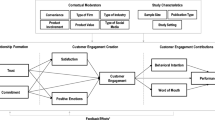Abstract
This research examines the effects of relationship quality (RQ) on customers' desires to retaliate after service failures. We posit that the effects of RQ are contingent upon the attributions customers make about the firm’s controllability over a service failure. Two competing hypotheses are examined and reconciled. The “love is blind” hypothesis posits that when low controllability is inferred, high RQ customers experience a lesser desire for retaliation than low RQ customers. On the other hand, the “love becomes hate” hypothesis specifies that when high controllability is inferred, high RQ customers experience a greater desire for retaliation than low RQ customers. The hypotheses are tested with a survey-based design and a partial least squares (PLS) model that incorporates a multiplicative latent construct.
Similar content being viewed by others
References
Ahluwalia, R. (2000). Examination of Psychological Processes Underlying Resistance to Persuasion. Journal of Consumer Research, 27, 217–232.
Anderson, J. C. & James A. Narus. (1991). Partnering as a Focused Market Strategy. California Management Review, 95–113.
Aquino, K., Tripp, T. M., & Robert J. Bies. (2001). How Employees Respond to Personal Offense: The Effects of Blame Attribution, Victim Status, and Offender Status on Revenge and Reconciliation. Journal of Applied Psychology, 86, 52–59.
Bhattacharya, C. B., Rao, H. & Glynn M. A. (1995). Understanding the Bond of Identification: An Investigation of its Correlates Among Art Museum Members. Journal of Marketing, 59, 46–57.
Bollen, K. A. & Lennox, R. (1991). Conventional Wisdom on Measurement: A Structural Equation Perspective. Psychological Bulletin, 110, 305–314.
Joel, B., Tyler, T. R., & Cooper-Schneider, R. (1992). The Influence of Prior Commitment to an Institution on Reactions to Perceived Unfairness: The Higher They Are, the Harder They Fall. Administrative Science Quarterly, 37, 241–261.
Chin, W. W. (1998). The Partial Least Squares Approach to Structural Equation Modeling. In G.A. Marcoulides (Ed.), Modern methods for business research (pp. 295–336). Mahwah, NJ: Lawrence Erlbaum Associates.
Chin, W. W., Marcolin, B. L., & Newsted, P. R. (2003). A PLS Latent Variable Modeling Approach for Measuring Interaction Effects: A Monte Carlo Simulation Study and Voice Electronic-Mail/Adoption Study. Information System Research, 14, 189–217.
Cohen, J., & Cohen, P. (1983). Applied multiple regression/correlation analysis for the behavioral sciences - Second Edition, Hillsdale, NJ: Lawrence Erlbaum Associates.
Crosby, L. A, Evans, K. R., & Cowles, D. (1990). RQ in Services Selling: An Interpersonal Influence Perspective. Journal of Marketing, 54, 68–81.
Dellande, S., Gilles, M. C., & Graham, J. L. (2004). Gaining Compliance and Losing Weight: The Role of the Service Provider in Health Care Services. Journal of Marketing, 69, 78–91.
De Wulf, K., Oderkerken-Schröder, G., & Iacobucci, D. (2001). Investment in Consumer Relationships: A Cross-Country and Cross-Industry Exploration. Journal of Marketing, 65, 33–50.
Dowling, G. R. & Uncles, M. (1997). Do Customer Loyalty Programs Really Work? Sloan Management Review, 38, 71–82.
Folkes, V. S. (1984). Consumer Reactions to Product Failures: An Attributional Approach. Journal of Consumer Research, 10, 398–409.
Herr, P. M., Sherman, S. J., & Fazio, R. H. (1983). Consequences of Priming: Assimilation and Contrast Effects.Journal of Experimental Social Psychology, 19, 323–340.
Hulland, J. (1999). Use of Partial Least Square (PLS) in Strategic Management Research: A Review of Four Recent Studies. Strategic Management Journal, 20, 194–204.
Lind E. A., & Tyler, T. R. (1988). The social psychology of procedural justice, New York: Plenum.
Maxham, J. G. III & Richard G. Netemeyer. (2002). A Longitudinal Study of Complaining Customers' Evaluation of Multiple Service Failures and Recovery Efforts. Journal of Marketing, 66, 57–71.
McCullough, M., Rachal, C., Sandage, S., Worthington Jr., E., & Terry Hight. (1998). Interpersonal Forgiving in Close Relationship II: Theoretical Elaboration and Measurement. Journal of Personality and Social Psychology, 75, 1586–1603.
Reinartz, W. J. & Kumar, V. (2000). On the Profitability of Long-Life Customers in a Noncontractual Setting: An Empirical Investigation and Implications for Marketing. Journal of Marketing, 64, 17–35.
Robinson, S. L. (1996). Trust and Breach of the Psychological Contract. Administrative Science Quarterly, 41, 574–599.
Rigby, D. K., Reichheld, F. F., & Schefter, P. (2002). Avoid the Four Perils of CRM. Harvard Business Review, 81, 5–11.
Sirdeshmukh, D., Singh, J., & Sabol, B. (2002). Consumer trust, value, and loyalty in relational exchanges. Journal of Marketing, 66, 15–37.
Singh, Jagdip. (1988). Consumer Complaint Intentions and Behavior: Definitional and Taxonomical Issues. Journal of Marketing, 52, 93–107.
Skarlicki, D. P. & Folger, R. (1997). Retaliation in Workplace: Role of Distributive, Procedural and Interactional Justice. Journal of Applied Psychology, 82, 434–443.
Smith, A. K., Bolton, R. N., & Wagner, J. (1999). A Model of Customer Satisfaction with Service Encounters Involving Failure and Recovery. Journal of Marketing Research, 36, 356–372.
Tax, S. S., Brown, S. W., & Chandrashekaran, M. (1998). Customer Evaluations of Service Complaint Experiences: Implications for Relationship Marketing. Journal of Marketing, 62, 60–76.
Thibaut, J. & Walker, L. (1975). Procedural justice: A psychological analysis. Hillsdale, NJ: Lawrence Eralbaum Associates.
Author information
Authors and Affiliations
Corresponding author
Rights and permissions
About this article
Cite this article
Grégoire, Y., Fisher, R.J. The effects of relationship quality on customer retaliation. Market Lett 17, 31–46 (2006). https://doi.org/10.1007/s11002-006-3796-4
Issue Date:
DOI: https://doi.org/10.1007/s11002-006-3796-4




